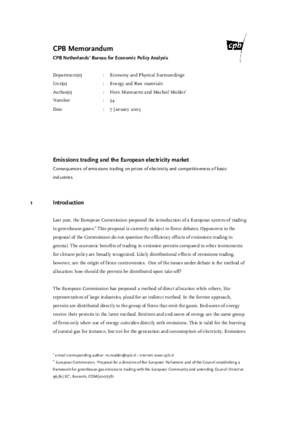Emissions trading and the European electricity market: Consequences of emissions trading on prices of electricity and competitiveness of basic industries
Opponents to the proposal of the Commission do not question the efficiency effects of emissions trading in general. The economic benefits of trading in emission permits compared to other instruments for climate policy are broadly recognized. Likely distributional effects of emissions trading, however, are the origin of fierce controversies.
The European Commission has proposed a method of direct allocation while others, like representatives of large industries, plead for an indirect method. In the former approach, permits are distributed directly to the group of firms that emit the gases. End-users of energy receive their permits in the latter method. Emitters and end-users of energy are the same group of firms only when use of energy coincides directly with emissions.
This is valid for the burning of natural gas for instance, but not for the generation and consumption of electricity. Emissions of carbon dioxide result from electricity production when power is generated by means of coal, oil, or gas fired plants. Consumption of electricity does not generate any emissions. Consequently, the direct allocation of permits implies that power plants receive the permits while electricity users obtain them when the indirect approach is followed. The debate on the method of allocation concerns its effects on the price of electricity and the competitiveness of large users of electricity. Questions that have to be answered are: “will power producers raise their prices if they obtain their permits free of charge?", and “to which extent does a rise in electricity price affect industries such as Steel, and Aluminium?". The Netherlands' Committee “Allocating emission permits" has asked the CPB to answer these questions.
